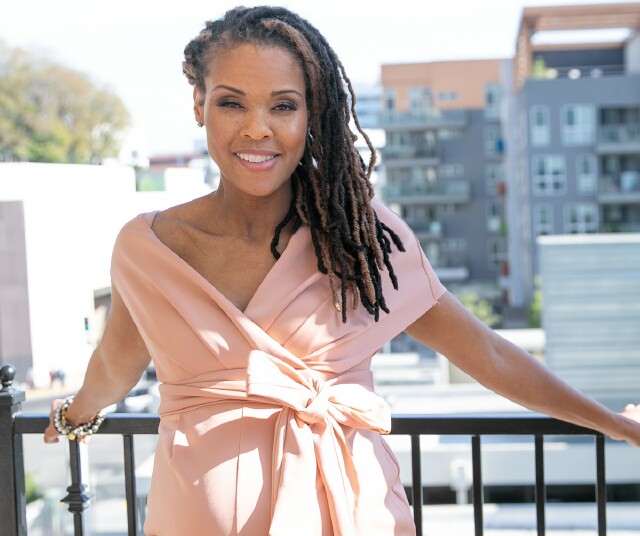Seeing Yourself in Action: Reflections on the AspireTV Upfront

AspireTV has recently released its strategic Upfront strategy for the new season. Already a leading voice in content focused on the black audience, the network continues to solidify its position as a black culture and urban lifestyle brand. Led in that effort by general manager Melissa Ingram, it has committed to serving the highly desirable audience of black consumers that still manage to be underserved by mainstream content providers. In the interview below, Ingram shares her thought process on AspireTV's strategy, behavioral trends in the African American marketplace and where AspireTV is headed next.
I often wondered if there was a place for me,
A place where I could be, free.
Free from barriers placed upon my skin,
Free from all the trauma kept within.
I, just want, to be myself.
Rock an afro, cornrows, free myself.
Finally, a space, where I, can see myself.
Beautiful black bodies and brilliant minds,
Breaking norms they redefine.
Hidden gems between the lines,
Creating platforms for us to shine.
We are deeply rooted and connected,
Our stories, our culture, we, project it.
This is a space, imperfectly perfected,
To eat, live, shop, play dream — and see yourself reflected.
-- AspireTV Manifesto
Philip McKenzie: Tell me about the AspireTV Manifesto and how the 3 Cs of Culture, Connection and Commitment play a role?
Melissa Ingram: The AspireTV Manifesto exists because we wanted to release a public statement that embodied the importance of representation for our audience and brought our brand promise of “See Yourself Here” to life. There has been a growing sentiment in the black community around the desire and need to see others that look like you on widespread platforms. We heard Tracee Ellis Ross, Oprah Winfrey, Spike Lee, Taraji P. Henson and others recollect the first time they saw themselves culturally represented in media and the importance of that moment. Our goal was to capture that same spirit and that same ethos from the voices of ordinary people.
Our Manifesto speaks to the culture AspireTV reflects and our deep connection and commitment to the black community. While we believe it is important to hear from celebrities and entertainers about the importance of representation, we wanted to ensure that the Manifesto embodied the sentiments of everyday people within our community, as well, and maintain a legacy for that audience.
McKenzie: Why do you think it is important to emphasize “fresh faces, real voices” in your coming season?
Ingram: While we accept that there is worth in familiarity, and acquiring content with recognizable talent is valuable, at AspireTV we have maintained a commitment since our launch to identify new, fresh faces. This Upfront season strategy encompasses three elements: fresh faces, real voices and new experiences.
We keenly understand that it is vital to our business as a culture and lifestyle brand to be a platform for fresh, influential and new faces and voices. Groundbreaking talent like Lena Waithe, Ava DuVernay and Ryan Coogler were once considered “new,” and we want to be a content platform that nurtures the “new” and “next.” When our viewers tune in to AspireTV, we want to ensure they are not only getting their legacy favorites like Bernie Mac, My Wife and Kids, In Living Color, The Hughleys and In the House, but that they also discover the next tier of talent with unique voices that they can identify with and need to be on their radar. A great example of this is our partnership with Damn Write Originals for the production of original short independent films, solidifying AspireTV as one of the few networks commissioning the production of independent films. We put our weight and budgets behind making sure fresh faces and new voices get the exposure they deserve and make their mark.
McKenzie: What are some African American behavioral trends that AspireTV has identified when building your Upfront strategy?
Ingram: Research has shown that African Americans watch more TV in real time and 29 percent watch more TV than the general audience. Also, African American TV viewers enjoy lifestyle programming. These numbers tell us that there is an audience that is still engaged with the medium and is also interested in lifestyle programming such as cooking, home design, talk, style and fashion. Yet, this audience has a strong interest in seeing more reflections of themselves in that lifestyle programming. So, AspireTV chose to fill a topical and cultural need for accurate representation of the black experience in lifestyle programming. In other words, the aesthetics of lifestyle programming should resonate with and reflect the black experience -- and only AspireTV does that.
Additionally, 72 percent of black TV viewers surveyed said that AspireTV offers content they “can’t get anywhere else,” and 91 percent said that AspireTV is “unique” and “original” when compared to other lifestyle networks. That is a compelling value proposition to advertisers eager to reach this desirable audience.
McKenzie: How do both AspireTV’s Manifesto and the tagline “See Yourself Here” support one another as a call to action for the brand?
Ingram: We know and recognize that the black community originates and drives many of the trends we see not just domestically, but globally. AspireTV takes that reality and actively shares it, recognizes it and celebrates it -- delivering on the brand promise “See Yourself Here,” which is more than a tagline; it is the guiding light in how we manage our business.
The Aspire TV Manifesto not only exemplifies our brand promise of “See Yourself Here” but also demonstrates our reflection of our brand verticals - -- the way in which the black audience eats, lives, shop, plays and dreams. Our hope is that through experiencing our brand, our audience is inspired and empowered not just to eat, but to eat well; not just live, but live their life, as you only have one; not just shop, but to shop with purpose; not just play, but to play hard; and, most importantly, not just dream, but to dream big.
The AspireMKTPLC is a prime example of our tagline “See Yourself Here” and the Manifesto coming to life. AspireTV empowers its audience, as affluent consumers, to “shop with purpose” and to promote wealth in the black community by profiling and promoting black businesses across all of our platforms. At AspireTV, we understand that when this audience activates its consumer choices by shopping, its more than just a purchase, but rather a conscious decision to keep the black dollar in the community a little while longer.
“See Yourself Here” is so much more than a tagline and “Shop With Purpose” is so much more than a mantra. They are movements.
McKenzie: What does the pipeline look like as you continue to develop programming?
Ingram: Our attention is going to be on developing new experiences like a podcast/audio offering because our audience is increasingly turning to that medium. We are developing a concept that will take a look at black-owned businesses and shine a light on black entrepreneurs and business owners across a wide range of industries. On a more traditional lifestyle front, we are developing a home rehab/lifestyle show that will be significantly different from other rehab shows because it has a cultural perspective of transforming existing neighborhoods rather than gentrifying them.
The perspective our talent brings to the table is very much in line with the AspireTV brand and the needs of our audience. Our thriving verticals of lifestyle originals, legacy programming and potential new shows have me more than excited for the quality programming that AspireTV will bring to our audience. This is a year when we will not only continue to “see ourselves,” but also “be ourselves” in the best way.
Don't stop now! Stay in the know on everything uplifting and entertaining at UPtv and Aspire with more from UPtv/Aspire InSites.
Click the social buttons to share this story with colleagues and friends.
The opinions expressed here are the author's views and do not necessarily represent the views of MediaVillage.com/MyersBizNet.


